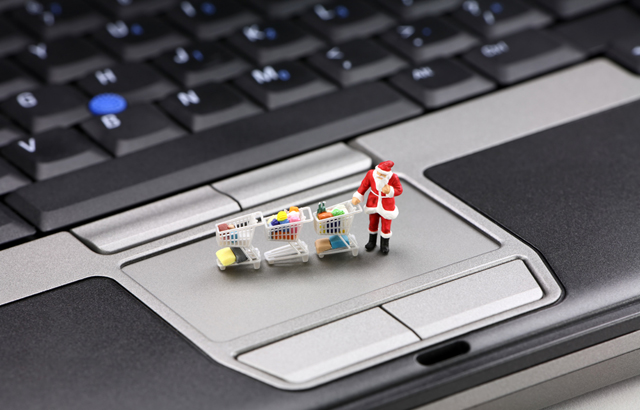Sure, Christmas is the the most wonderful time of the year, but it’s also one of the most stressful. Basically, there’s a lot to see and do in a short space of time and don’t we know it.
Work is typically busy, family life is manic as ever, and there are plenty of festive-themed socials to fit into an already manic schedule. By the time it’s Christmas Eve, there we are, exhausted in front of the TV with a well-deserved cup of tea or glass of mulled wine, wondering how we got through it all.
Oh, and that’s not even mentioning the fact that throughout this period, we all have to give Santa Claus a helping hand and figure out what to get our loved ones for Christmas Day.
Thankfully, over the last few years, this previously shattering and, at times, maddening activity, has become altogether simpler … fun even. Courtesy of secure online shopping, it’s now one of those things that we can enjoy.
From being deskbound to being here, there and everywhere

Not that long ago, online shopping was pretty much a desktop activity, if not a living room pursuit (via a laptop). However, as of late, with the growth in popularity of tablets and the increasing power – and size – of smartphones, online shopping habits have changed tremendously. The results are fascinating.
As a new survey from ESET reveals, not only are people regularly shopping online more and more (just under 50 percent and 40 percent for UK and US customers respectively), but their approach to it is also changing.
For example, a multitude of devices are being used to make purchases, the poll from the leading security company confirmed. The idea that there is ‘one-device for everything’ is becoming obsolete.
Laptops, interestingly, remain the go-to device for online shopping, followed by mobile devices for people in the UK, and desktops in the US. This suggests that the former still has some reservations about mobile devices, but in terms of general trends, mobile phones and tablets are likely to be preferred channel for consumers across the world.
"Commuter Commerce ... the next frontier in online shopping."
This, in turn, will further influence where people shop and, funnily enough, result in people once again purchasing beyond the comfort of their home. ‘Commuter Commerce’, as it has been dubbed, is an increasingly popular movement, one you may find yourself indulging in when stuck in traffic this Christmas.
“From doing the weekly shop to buying tickets for a gig, commuters are becoming increasingly comfortable with shopping on their mobile devices wherever they are,” Peter Keenan, CEO of Zapp, commented earlier this year when his company published a study into this burgeoning area.
“But fishing out your credit or debit card and then tapping in a long sequence of numbers does not represent the ideal checkout experience on a packed train. If commuter commerce is to continue to flourish we need faster, safer mobile payment methods.”
Secure online shopping is increasingly important for consumers

Mr Zapp made an important point in noting the desire people have for safer payment methods, as cybercrime presents itself as a growing and significant challenge to the ease and convenience of online shopping.
Not a day now goes by without another topical news story highlighting another vicious threat of cybercrime. Ensuring that you are protected at all times – and doubly vigilant during exceptional trading periods like Christmas – as well as across all your devices, mobile and otherwise, is increasingly important.
ESET’s survey suggests that more and more individuals, in the UK and US, are becoming accustomed to this fact, with the majority of respondents to its poll either investing in a traditional security solution or a specialist security solution when shopping online.
In the US there is a preference for the former, while in the UK there is a marked interest in the latter. Worryingly, around 12 percent of online shoppers don’t use any kind of protection, which is extremely risky to say the least.
Luckily, this is a minority occurrence, and there are more positive findings from the survey to suggest people have a commonsense approach to online shopping. For example, when it comes to the kind of websites that people turn to, consumers appreciate the security that comes with well-known brands or names that they ‘personally trust’.
This is excellent news and it seems like our most recent guide is working its magic, because sticking with brands that have a strong reputation, along with using credit cards and secure payment services offered by the likes of PayPal, are some of the recommendations we made for safe online shopping in October.
Moreover, as respondents to ESET’s poll revealed, payment methods like credit cards – the number one payment method for online shopping in the US – and PayPal-esque services – number one for the UK – are the most popular among online shoppers. Again, this is another positive, as they are some of the most secure ways of paying. It seems then that we’re getting better.
Staying safe at Christmas and beyond

While cybercriminals certainly increase their activity at busy times of the year, like as Christmas, they are also, like some predators in the wild, patient observers of their victims during so-called quieter periods (although the festive period is getting longer and longer!) The threat is very real, whatever the day, the month, or the season.
As a result of this and with online shopping growing in popularity – the industry was worth some $1.3 trillion in 2014 – being aware of cybercrime, the kinds of tricks criminals have up their sleeves, and the security solutions that are at your disposal is essential if you are going to get the most out of being a consumer on the web, whether you’re at home or on the go.




